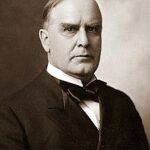McKinley’s Vision for International Commerce
President William McKinley’s participation in the Pan-American Exposition represented a pivotal moment in American diplomatic history. The Buffalo exposition opened on May 1, 1901, showcasing technological marvels and cultural achievements from across the Western Hemisphere. McKinley saw this event as more than entertainment. He viewed it as a platform for advancing his vision of peaceful international cooperation through expanded trade relationships. 📊
The President’s Final Speech on Trade Policy
On September 5, 1901, McKinley delivered what would become his final major address at the Pan-American Exposition. His speech emphasized reciprocal trade agreements as the foundation for international peace and prosperity. The president argued that isolationism had become obsolete in the modern world. He promoted the idea that nations must work together through commerce to achieve mutual benefits. McKinley’s words resonated with business leaders and diplomats who recognized America’s growing economic power. 💰
Advancing Hemispheric Cooperation
The Pan-American Exposition served as McKinley’s vehicle for strengthening relationships with Latin American nations. His administration had already negotiated several reciprocal trade agreements with Caribbean and South American countries. The exposition provided a forum for expanding these partnerships and demonstrating America’s commitment to regional leadership. McKinley’s approach emphasized economic cooperation rather than military intervention, setting a foundation for future diplomatic initiatives. ⚠️
Impact:
Establishing America’s Role as a Responsible World Power
McKinley’s Pan-American Exposition initiatives fundamentally transformed America’s international reputation during the early 20th century. His emphasis on reciprocal trade agreements created a framework for peaceful economic expansion that benefited multiple nations. The president’s vision helped establish the United States as a responsible leader rather than an aggressive imperial power. This approach influenced subsequent administrations and shaped American foreign policy for decades. Business communities across the hemisphere embraced McKinley’s trade-focused diplomacy as a pathway to prosperity. 🌍
Economic Benefits and Trade Expansion
The reciprocal trade policies promoted at the Pan-American Exposition generated significant economic benefits for American businesses and trading partners. McKinley’s agreements reduced tariff barriers and opened new markets for agricultural and manufactured goods. Export volumes to Latin American countries increased substantially following these diplomatic initiatives. American farmers gained access to new markets for their products, while manufacturers found expanded opportunities for industrial goods. The president’s trade policies created jobs and stimulated economic growth across multiple sectors. 💰
Long-term Diplomatic Legacy
McKinley’s final speech at the Pan-American Exposition became a foundational document for American international relations in the 20th century. His vision of peaceful cooperation through trade influenced the development of later international organizations and agreements. The president’s emphasis on mutual benefit rather than exploitation set important precedents for future diplomatic engagement. Historians recognize this exposition as a turning point when America embraced its role as a global leader committed to international cooperation and economic partnership. 🔥
